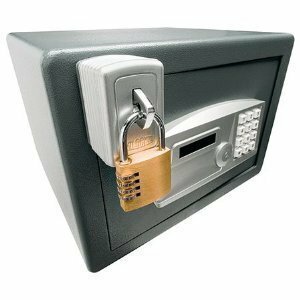Hotels know that their guest rooms are the targets of frequent thefts and therefore protect themselves with legal language similar to the following, “The Hotel does not accept responsibility for damage to the Guest’s possessions, or for theft from the room(s) where the Guests are residing.”
Most jurisdictions maintain some some form of “Innkeepers Laws” and almost all of these laws limit liability to the hotel operators unless the hotel is proven to be grossly negligent or the thief is proven to be a hotel employee. Of course, proving the hotels negligence will usually require hundreds of hours from a competent legal team. And, if you can prove that a hotel employee stole your property, you have probably already recovered your property from the thief.
In more simple terms: Once your property is gone, it’s gone and you won’t be recompensed by the hotel operators.
Hotel Safes
To reduce theft, many hotels are now providing small in-room safes to their guests. These safes are almost always cheap electronic models which offer very limited security. Most are vulnerable to numerous attacks.
Safe Removal
Many in-room hotel safes are bolted to flimsy plywood panels. The safes can be removed with a crowbar and taken off-site to be opened at the thief’s leisure.
Master Codes or Master Keys
Hotel guests frequently forget the pass codes they set for their in-room safes. Because of this, the safe manufacturers put “back door” passwords into the safes which allow hotel management to open any in-room safe. These “master codes” are usually the same for every safe in a hotel, and are often left at manufacturer defaults like “000000.”
Even where mechanical locks are used, hotel management must have master keys — which can be misused or copied by unscrupulous hotel employees.
Limited Pass Code Options
Many cheap electronic safes limit the number of digits in a passcode to 4 or 6 digits. This makes it possible for a thief to simply try all possible pass codes.
Bouncing
Many inexpensive hotel safes can be made to open by hitting them hard enough to “bounce” the lock mechanism open. Others can be opened by picking them up and bouncing them against a hard surface. Watch these videos to see how easy the process is:
Hotel Room Anti-Theft Security Tips
 The easiest advice is this: If you must take anything of value on your trip, keep it with you at all times.
The easiest advice is this: If you must take anything of value on your trip, keep it with you at all times.
If you cannot keep your valuables with you, store them in the hotel’s safe at the front desk. In most jurisdictions this creates a legal liability for the hotel under bailment laws.
Set the “Do Not Disturb” indicator on your door at all times, unless you are physically present to observe the hotel staff cleaning your room.
Play the TV or radio softly while you are away, to create the impression that you are present in the room.
If you have to keep valuables in a hotel safe, you can increase the security of the safe by adding a Milockie lock to the outside of the safe. This will add one more lock which the thieves will have to defeat to get to your valuables.
Always report all losses to the local police. This may not help you, but it may provide an invaluable service to the theft victims after you. After enough reports, police do sometimes take action.
